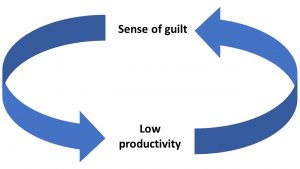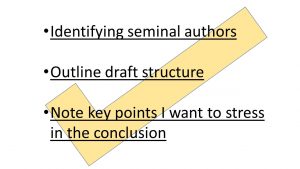Katheryn Margaret Pascoe
DTA3 Social Policy Researcher and DTA Rep Committee Co-Chair
Ulster University
@PascoeKm
Like many of us completing PhDs here in the UK, I have been working from home since March 2020. Initially there was a mad rush to ensure I had the right technology and software, not to mention the essential textbooks, notebooks, and toilet paper.
However, even though preparations smoothed the transition to remote working,
“I quickly realised that working from home also meant living at work .”
As the weeks and months passed by, days started to blur into one another with no distinction between Sundays, Tuesdays or Fridays. I lost track of the date, and time felt like it was standing still while rapidly slipping away. Without going into the office, I found myself disconnected from my community of peers which had been a great source of motivation and support. My productivity levels dropped. This made me feel guilty and triggered a negative cycle wherein my guilt lowered productivity and low productivity induced guilt.

How to break the cycle
Despite spending the better part of 2020 indoors, I have found several strategies useful for maintaining focus and managing to make progress. These could be useful for other researchers who find themselves in a similar position.
Time blocking
Set a timer for one hour and have specific goals set for each period of time. Turn the phone off, exit emails and resist the urge to binge watch Friends, Tiger King or How I Met Your Mother (it’s ok, we’ve all been there).
To start with, I reduced my expectations. Instead of pushing myself to work an 8-hour day, as if I was in the office, I aimed for 2 or 3 periods. I considered this a success by telling myself 2 hours of focused work was better than 8 hours of procrastination. Each time my alarm went off, I got up, moved about, did a few squats or made a cup of tea. These small breaks helped me reset and stay focused. If an hour seems too long (or perhaps even too short once you hit your flow), experiment and find what works best for you.
Tiny tasks
Breaking my goals into very small tangible tasks helped to reduce the overwhelming sense of swimming through treacle. Instead of telling myself, “Today I will write the background chapter,” I began to break it down into smaller tasks.

Ticking these smaller tasks of the list shows progress and can make that overarching goal no longer feel insurmountable.
Dedicated workspace
 Within two months of working from home, my living room was an exploded office. Diagrams pinned on the walls, books all over my desk, post it notes littering the dining table, annotated articles spilling onto the floor. Once I was able to consolidate the academic shrapnel, I had more room to breathe.
Within two months of working from home, my living room was an exploded office. Diagrams pinned on the walls, books all over my desk, post it notes littering the dining table, annotated articles spilling onto the floor. Once I was able to consolidate the academic shrapnel, I had more room to breathe.
Having space, however, is a privilege. If you are restricted in choice, the best advice I can give is to keep work away from your bed. During the first year of my undergraduate degree, my bed called out to me as comfortable, warm and with room to spread everything out. Unfortunately, I quickly found that once my studies permeated my bed, there was no escape. I unconsciously associated my bed with work, keeping me up at night, seeping into my dreams.
Group support
Following a virtual writing retreat for PhD researchers, a few of us developed a weekly online catch up. Meeting over Zoom for half an hour each week held us accountable to one another, as we shared our goals for the day. By scheduling it in at a regular time, we were consistent. It became something to look forward to, offering much needed human contact to beat the blues of social isolation. And there’s an added bonus – regular catch ups can help you keep track of the days of the week too.
With the current lockdown across the UK, returning to the office seems like a distant dream. And even once it becomes safe to return, I expect that a blend of working from home and the office will become the norm for many of us on our future career paths. So I encourage you to try some of these strategies yourself. They have really helped to reduce the Groundhog Day vibe, flipping the situation back to working from home, not living at work.




